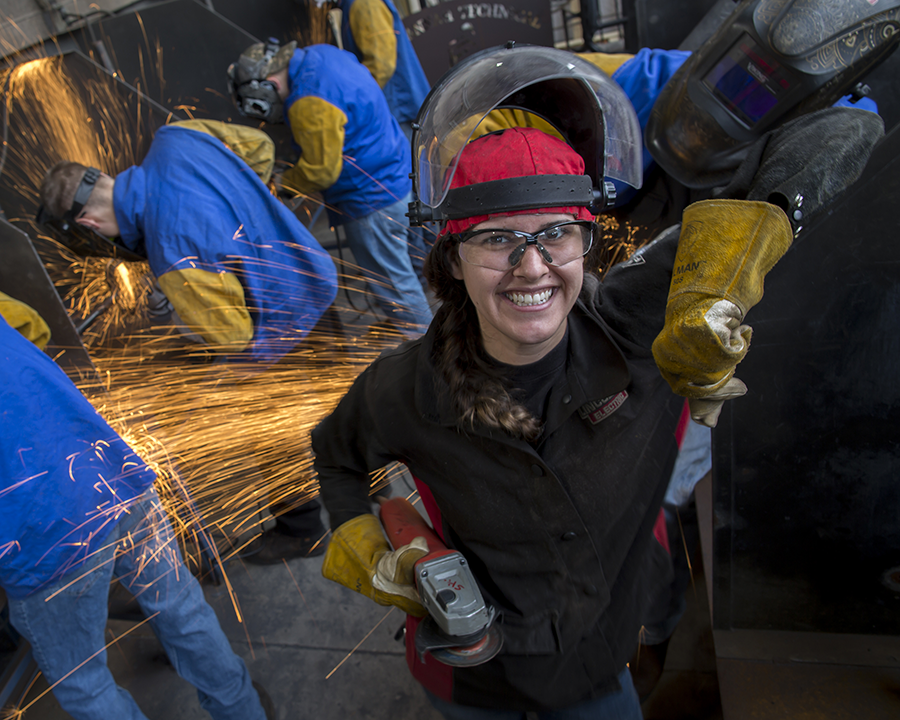
Section Branding
Header Content
She Was Waiting Tables in 2015. Now She Has a Lifelong Career. You Could, Too
Primary Content

Skylar Huggett always knew she wanted something more. She didn’t know exactly what that meant, but she did know it meant something different than waiting tables.
We all have a different Eureka! moment. For some it’s travelling to a new place. For others it’s reading about something they’ve never known about. For Huggett it was a documentary, of all things.
While in Savannah, Georgia, waiting tables and sort of going through the motions of life, Huggett caught part of a documentary on welding. That’s all it took to get her mind going. I guess you could say it was love at first spark.
"I knew I wanted to do a trade,” Huggett told me. “I had to give it a shot. That’s when I enrolled in Savannah Technical College. So I just signed myself up. Luckily enough I loved it.
That piece of inspiration led Huggett down the fast path to a new career. After enrolling at Savannah Tech in October of 2015, Huggett recently graduated and began her first position at Thunderbolt Marine in May.
Huggett and I spoke over the phone about her second chance at a new life. What challenges did she face as a woman in a man’s world (welding)? Not many, as you’ll see. For welders it’s all about whether or not you can get the job done.
We also spoke about what options students have for free tuition, like the HOPE Career Grant, which I told you about a few weeks ago. It’s free college tuition, people. It’s amazing and you should check it out.
Huggett is a real inspiration. She took control over her life and in the process became one of the best students in the state, culminating in her being awarded Georgia Occupational Award of Leadership (GOAL) by Governor Nathan Deal. GOAL winners are viewed as the state’s technical college student of the year.
So without further ado, here’s Skylar.
Georgia@Work: Why focus on a trade? What was it about a trade that caught your interest?
Skylar Huggett: I knew I wanted to do a trade because so many of my friends were going to universities and it wasn’t what they thought it would be after graduating. My best friend has a bachelor’s degree in molecular biology and other friends were studying history, journalism, and things like that, and I saw that once they graduated they were doing the same things I was doing, which was waiting tables. It took so long for them to find a job, or they weren’t even doing a job for which they had studied.
G@W: Why welding? Why not another trade like IT, which is booming in Georgia?
SH: I thought welding would be lucrative and I like the challenge and I like to work with my hands. I wanted to do something that I wouldn’t be bored with.
G@W: When did you know you made the right choice?
SH: Once I got out of the book classes and got to the cutting class where we learned the basics of welding and cutting metal, really getting your hands on materials you’ve been reading and talking about, once I put my hand on that cutting torch and sparks actually started to fly… woooo, it was so powerful and awesome.
I knew that moment right then and there that I was going to stick it out to the end. I figured if this was just the beginning of cutting metal, I couldn’t imagine what it was going to be like to fuse two pieces of metal to make something.
G@W: Going from associate’s degree to waiting tables to back to school can be a tricky transition. Was it difficult for you?
SH: It was a pretty smooth transition, but I was there to learn. I was there to learn how to weld and get a job and be successful and be happy with whatever I chose.
G@W: Welding is a very male-dominated industry. What do you think could be done by the industry or the schools training the workers to entice women into the field?
SH: Just to see the fact that there are women in that field. We should give them a spotlight just to show that we’re out there. Women can do it just as well as men and to not be deterred from that option. I think showing that there are women in the field could get other women to say, “Hey, just because it’s mostly men doesn’t mean women can’t do it, too.”
G@W: We often hear about how many jobs are out there for welders (and other skilled trades). Was that the case for you, or was that more fiction than fact?
SH: I was a little nervous about that process to be honest with you. When I was in the program I went on Indeed.com just to see. We hear a lot about how much welders can make and I went on to see what was out there. The job list was so overwhelming. It blew my mind how many jobs were out there for a welder. It encouraged me and kept me going.
G@W: You utilized the Hope Career Grant, correct? How much of help was that?
SH: I did get that, which was a huge surprise. When I got to Savannah Tech those semester refund checks come in and I received my usual check and then I got another check with ‘SIWDG’ [it was formerly known as the Strategic Industries Workforce Development Grant] on the check and I had no clue what that was. That’s when I found out that when you choose a program in which the workforce is in high demand, they give you money to go to school. I had no idea! That was just the greatest blessing I could have had. I had no idea!
G@W: What did Technical College do for your future?
SH: I wanted something that when I have a child I could really let them know about and be proud of. Having that opportunity and to be able to support myself and make something of myself and to be proud. Technical education really did that for me. If you’re a hands-on learner Technical school could be perfect for you.
I don’t feel like I go to work everyday. I find myself smiling as I drive to work at 6:30 in the morning and when I get off and I’m tired and dirty, I still find myself smiling because that was fun. Who can say they went to work and had fun? Even though it was hard, I had fun today.
Skylar Huggett used the Technical College System of Georgia to kickstart a new career.





